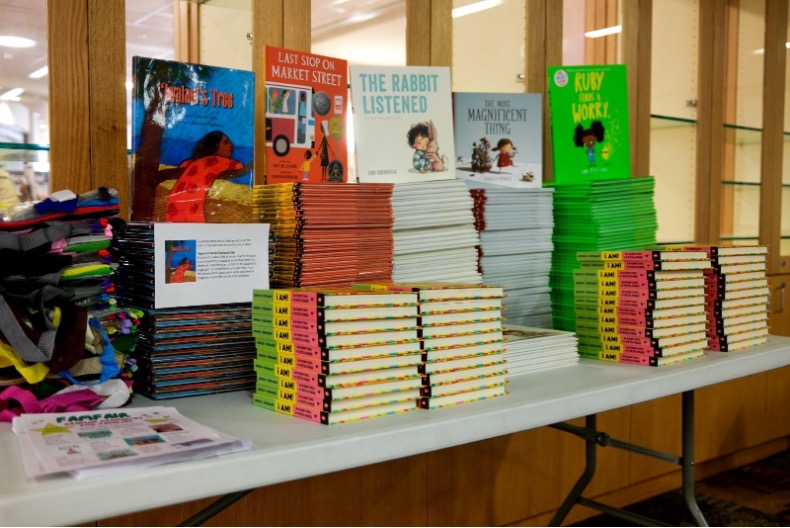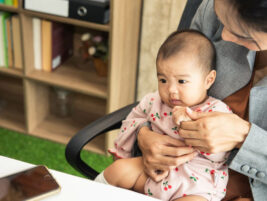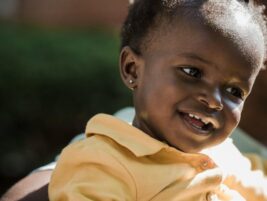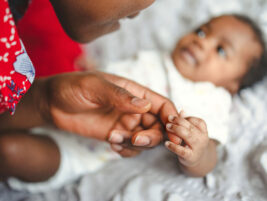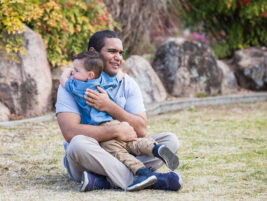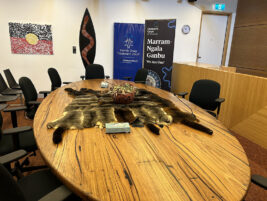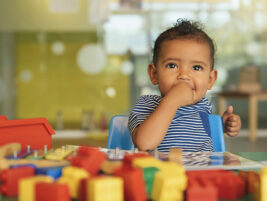Abstract
This article introduces WeRead (WR) and Nosotros Leemos (NL), early literacy and language development psychoeducation programs designed for caregivers and their children ages 0-3. Offered both in English and Spanish, these programs are inspired by a play-based psychoeducation model and aim to address the growing need for language development and early literacy support in the Denver Metro area. WR and NL programming is made possible through a collaborative partnership involving our generous funder, Taylor Kirkpatrick, the Baby S.T.E.P.S. (Supporting Teachers, Educators, Parents, and Service Providers) Lab at the Graduate School of Professional Psychology, and University Libraries at the University of Denver. This initiative not only highlights a strong interdepartmental university collaboration but also a meaningful community partnership with the Denver Public Library’s (DPL) Early Learning Department, the Clyfford Still Art Museum, and Rocky Mountain Human Services (RMHS). Through this collaboration, related programming is promoted for a shared population, creating a greater impact in the community. The article also explores the potential for expanding these initiatives and considers how similar models can be applied to other early childhood and parenting support programs.
Keywords: early language development, early literacy, community collaborations
WeRead: Promoting Early Literacy Programming Through Community Collaboration
Research emphasizes the important role of reading with children, including infants, in fostering early literacy, language development, and parent-child relationships (Byington et al., 2008; Egan et al., 2022; Jimenez et al., 2019; Klass, Miller-Fitzwater & High, 2024; McNally, 2023; Melzi, 2022; Muhinyi & Rowe, 2019; Murray & Egan, 2014). It also highlights the positive impact of psychoeducational programs supporting both English- and Spanish-speaking families (Byington et al., 2008; Child Mind Institute, 2023; Klass, Miller-Fitzwater, & High, 2024). Utilizing the team’s extensive knowledge of child development, literacy, and caregiver-child relationships, this programming seeks to partner with, and elevate existing community resources. In Colorado, early literacy initiatives provide books, host Storytimes, and offer text messages with literacy activities, local events, and resources (Colorado Department of Early Childhood, 2024), all of which make a positive difference. Integrating psychoeducational support and promoting awareness of programmes and resource offerings across various organizations may provide even greater benefits to the community.
The WeRead (WR) and Nosotros Leemos (NL) programs embody an approach that integrates group Storytime with psychoeducational support to advance language and literacy development in both English- and Spanish-speaking children while promoting positive psychosocial outcomes for caregivers. This paper presents WR and NL as models for integrating early literacy with psychoeducation as well as highlights additional community partner programs that are advancing similar efforts to support early childhood development.
Introducing WeRead and Nosotros Leemos
WR and NL serve families with children ages 0 to 36 months, drawing inspiration from WePlay© and Nosotros Jugamos (Antenucci et al., 2024; Gross et al., 2021), a play-based, psychoeducational initiative in the Denver metro area that support young children’s development and family’s well-being. Feedback from the program highlighted a need for greater focus on early language development and early literacy, leading to the creation of WR and NL. The WR and NL approach is grounded in research that shows when programming is aligned with families’ lived experiences, languages, and cultural contexts, it not only fosters greater engagement and more meaningful, affirming experiences but also promotes enhanced learning outcomes (Gay, 2020). Additionally, recent literature highlighting specific language and literacy needs of Spanish-speaking families emphasized the importance of early interventions that are culturally congruent and linguistically accessible. For example, Herrera et al. (2022) argues that early exposure to bilingual literacy not only supports language acquisition but also affirms cultural identity, which is critical in fostering long-term engagement. Given the importance of integrating skill-building and incorporating cultural identities into literacy programming, research also underscores the importance of programs considering the significance of trusted relationships with clinicians, access to tangible resources like books, caregivers’ literacy, and external stressors, such as poverty and competing parenting demands (Jimenez et al., 2023). These insights from the literature help inform best practices in developing a culturally sensitive program.
NL program development involves the intentional design of psychoeducational content, Storytime books, activities, and facilitated discussion topics that are deeply relevant to the cultural and linguistic experiences of Spanish-speaking families. The Early Childhood Readers Collection (ECRC) at the DU Libraries was established as a content and reference guide for WR and NL programming. It features diverse children’s literature in print and online formats including books in eight languages beyond English with approximately 100 titles in Spanish. Curated by DU’s faculty librarians, it celebrates inclusion across race, gender identity, sexual orientation, and disability, reflecting the diversity of the community. This emphasis offers both mirrors for self-identity and windows to understanding others, fostering belonging and appreciation for diversity, critical tenets of holistic early childhood development.
WR and NL groups consist of four weekly 35–45-minute sessions held at the University of Denver (DU) Libraries campus space. WR and NL include Storytime activities, immersive play, and facilitated psychoeducation group components which are are led by graduate students in the clinical psychology program at DU under supervision by DU faculty and Library Staff. Psychoeducation topics include the benefits of reading together in supporting caregiver-child relationships, language milestones, cognitive and emotional development, positive child behaviors, and other related topics, with time for discussion and questions. Participants also receive resource handouts, “We Readers” kits to extend learning at home, and access to guest speakers such as authors, child development experts, and other community agency leaders providing supportive programming for this population. Program effectiveness is monitored through ongoing evaluation efforts, which are an optional component for attendees to opt in or out of during programming. Based on evaluations and feedback, the WR and NL models will be continually adapted to meet the needs of families.
The We in WeRead
DPL offers LENA Start Language Development Program, a free initiative available in both English and Spanish, designed to support caregivers of young children enhance interactive communication and support early learning. Over 10 weekly sessions, parents receive personalized feedback on their verbal interactions, with guidance on improving conversations and reading. The program is delivered in a supportive group environment, where participants receive a kit containing books and LENA technology to track progress. Incentives are provided throughout the sessions, with details provided as the program progresses. Through LENA Start, caregivers learn effective strategies for talking and reading with their children while also understanding the importance of these interactions for early language development. Participants are connected to their neighborhood library branch and to one another, forming a parent support group. DPL also collaborates with other agencies and organizations to bring additional resources based on participant needs and interests. In addition to LENA Start, DPL offers a variety of other programs to support children’s language development, including Storytimes in English and Spanish and Little University. While Little University is not available in multiple languages, it provides a hands-on learning experience for families, helping them develop early learning skills in their home language. All of DPL’s programs are designed to support caregivers in fostering their child’s development while making learning enjoyable for both parents and children.
In addition, the CSM is dedicated to aligning itself as a resource for caregiver and infant mental health in the Denver community and beyond. CSM aims to support caregivers and equip them with the skills necessary to comfort and care for infants, which directly benefits infants’ mental health. The development of strong relationships, temperament, attachment styles, and a sense of self begins in infancy and is at the center of programming goals. In a 2022 study, Penn’s Positive Psychology Center found that “…museums – in particular, art museums – are good at reducing anxiety and depression” (Crimmins, 2022). To address these community needs, CSM offers Art Crawl, a program designed for infants and their caregivers which aims to provide a sense of belonging to young children and families at the CSM, supporting the development and learning of infants, and encouraging the development of community amongst participants. During the COVID-19 pandemic, caregivers, especially caregivers of infants, expressed feeling isolated and anxious. Art Crawl’s goal is to cultivate a sense of connection for caregivers, directly addresses those needs.
Furthermore, RMHS offers the Denver Early Steps program, which provides direct intervention services and supports to children ages 0-3 who are not eligible for the Early Intervention program but continue to show a 25-32 percent delay in their development. RMHS provides direct therapy and service coordination supports to all children who qualify for this program. Through this main program, RMHS has been able to develop a subprogram, Developmental Monitoring, which offers informal supports to children who are showing less than a 25 percent delay or are at risk of showing a delay in their development. The RMHS team supports families in completing various screeners and developmental monitoring tools such as the ASQ-3, ASQ-SE, and the PEARLS to help identify the child’s needs. In conjunction with these supports, children and families who are eligible for these programs can participate in the variety of generalized parenting classes we offer. These classes aim to help educate parents in areas that we commonly see delays and help build connection with other parents who may be experiencing similar things.
Looking ahead, our goal is to work with DPL, CSM, and RMHS to collaboratively promote each other’s programs across multiple locations in the Denver metro area. Through this collaboration, program facilitators will attend each other’s events, share resources with attendees, and create opportunities for families with young children to explore all relevant programming that support early childhood development. By engaging with our community partners, we can also introduce families to the WR and NL virtual resource libraries and recruit participants for the WR and NL research study, further strengthening our collective impact.
FamFair: It takes a village
One primary goal of the WR and NL programming is bringing community and university resources together in innovative and growth-focused manners. Hosting a regular gathering of community and university partners along with the caregivers and young children these resources seek to serve, is the inspiration behind FamFair. This yearly child and caregiver friendly conference style gathering showcases programming including WR and NL along with brief, child-friendly presentations from experts on child development and psychology. In the prior years, two events were hosted at the University of Denver with speakers including faculty, staff, and guests from outside universities and programs. A community resource fair accompanies the event, with community partners hosting tables to showcase their programming, expertise, and offerings to families in the area. Families are encouraged to attend with their children, for as long as they feel comfortable according to their children’s ages and comfort. Food and beverages are provided as are books and activities to take home. At the last FamFair, our generous funder, Taylor Kirkpatrick, wrote and recited a story for the event. We include it here as it showcases the family friendly, welcoming community feel of the event along with the focus on child development and early literacy.
A story about a young moose named Chocolate—Chocolate Moose.
Chocolate lived in a bustling forest filled with all kinds of animals, yet he often felt lonely. It wasn’t that he lacked company—the forest was lively and full of activity—but no one seemed to understand how he felt. One day, Chocolate decided to change that. He set out to meet the other animals and listen to their stories. He wanted to make new friends and learn about their own joys and challenges. He spoke to the wise owl, Owlivia, who perched high in a tree. Owlivia admitted she loved the stars but often felt isolated way up in the tree, awake while everyone else slept. Then Chocolate met the busy squirrel, Nutmeg, who enjoyed gathering food but constantly worried about the long winter ahead. Finally, he approached the gentle deer, Jane Doe, who loved to prance through the forest but was always anxious about making too much noise and drawing unwanted attention from the hunters.
As Chocolate listened, he realized that everyone had their own worries, and by understanding them, he didn’t feel so alone anymore, plus he made some new friends. They were no longer moosterious, and the forest didn’t feel so lonely anymore. It became a place full of friends with unique stories. The moosteries of the forest became clearer, and Chocolate felt a sense of belonging he’d never known.
When the librarian finished, Ashley asked, “How did such a tiny book hold so many feelings?”
The librarian winked. “Every story, no matter its size, can make us feel something deep inside. Books help us understand the feelings of others, and through their stories, we begin to understand our own forest better.
By reading, we learn how different lives are connected, and we grow closer to one another.”
From that day on, Ashley knew that books weren’t just full of stories—they were full of feelings, lessons, and friendships waiting to be discovered.
Summary
WR and NL provide early childhood and parenting support programs that blend early literacy, language development, and mental health support through culturally responsive psychoeducation to the community. These programs increase the availability of comprehensive, community-focused early literacy programs, particularly for bilingual families. The integration of in-person Storytimes, interactive and engaging activities that expand language communication between caregivers and children, psychoeducational support for caregivers, and community partnerships creates a holistic approach to early childhood literacy and language development. The programs’ use of evidence-based practices, ongoing feedback and evaluation, and adaptive programming ensure that they are responsive to the needs of diverse communities. Moving forward, similar models could be expanded to other early childhood initiatives, particularly those focusing on underserved communities, with an emphasis on integrating cultural relevance, community collaboration, and continuous evaluation to ensure effectiveness and scalability.
Acknowledgements
WR and NL would not be possible without the generosity and vision of Taylor Kirkpatrick (International MBA ‘04, Board of Trustees Member, University of Denver). Our team would also like to acknowledge the Denver Public Library Early Learning Department, Clyfford Still Museum, and Rocky Mountain Human Services’ support.
References
Antenucci, N.*, Adams, O.*, Cerqueira, M., Dugoni, H., Clarke, U., Elliott, K. L., Vozar, T. M. (2024). WePlay! Across the USA and abroad!: Implications of adaptation and expansion for a postpartum caregiver-child support program. International Journal of Birth and Parent Education, 11(3). *equal contributions
Baralt, M., Griffith, S. F., Hanson, K. L., André, N., Blair, L., & Bagner, D. M. (2022). How family needs informed an early literacy family reading program in multilingual and multicultural Miami-Dade County. Journal of Early Childhood Literacy, 14687984221093242.
Colorado Department of Early Childhood (CDEC) (2024). Early Literacy and Family Engagement. https://cdec.colorado.gov/early-literacy-and-family-engagement
Crimmins, P. (2022, June 14). Penn Researchers find mental health benefits in visiting museums, including reduced anxiety. WHYY: PBS. https://whyy.org/articles/mental-health-benefits-museums/
Education Development Center (2017). Supporting Emergent Bilingual Children in Early Learning. https://www.edc.org/sites/default/files/uploads/Supporting-Emergent-Bilingual-Children_English.pdf
Byington, C. L., Hobson, W. L., Torres-Nielsen, G., Winter, K., Ortiz, K. A., & Buchi, K. F. (2008). The good habit of reading (El Buen Habito de la Lectura): parental reactions to an enhanced Reach Out and Read program in a clinic for the underserved. Journal of Health Care for the Poor and Underserved, 19(2), 363.
Cox, J. L., Holden, J. M., & Sagovsky, R. (1987). Detection of postnatal depression: Development of the 10-item Edinburgh Postnatal Depression Scale. The British Journal of Psychiatry, 150, 782-786. https://doi.org/10.1192/bjp.150.6.782
Gay, G. (2000). Culturally responsive teaching: Theory, research, and practice. New York: Teachers College Press.
Herrera, S.G., Martinez, M.I., Olsen, L., & Soltero, S. (2022). Early literacy development and instructions for dual-language learners in early childhood education. https://multilingualliteracy.org/wp-content/uploads/2023/01/NCEL_ECE_White_Paper.pdf
Egan, S. M., Moloney, M., Pope, J., Breatnach, D., & Hoyne, C. (2022). From stories at bedtime to a love of reading: Parental practices and beliefs About reading with infants. Journal of Early Childhood Literacy, 14687984221123710.
Gross, L.*, Lavin, K.*, Moormeier, K., Pahwa, E., Cerqueira, M., Vozar, T. M. (2021). WePlay Denver: Introducing a flexible, caregiver-led parent-child group. Perspectives in Infant Mental Health Journal, 29(2). *equal contributions
Jimenez, M. E., Hudson, S. V., Lima, D., Mendelsohn, A. L., Pellerano, M., & Crabtree, B. F. (2019). Perspectives on shared reading among a sample of Latino parents. Child: Care, Health and Development, 45(2), 292-299.
Jimenez, M. E., Crabtree, B. F., Veras, J., Shelton, P. A., Mendelsohn, A. L., Mackie, T. I., Guevara, J. P., Pellerano, M., Lima, D., & Hudson, S. V. (2020). Latino parents’ experiences with literacy promotion in primary care: Facilitators and barriers. Academic Pediatrics, 20(8), 1177–1183. https://doi.org/10.1016/j.acap.2020.08.001
Klass, P., Miller-Fitzwater, A., & High, P. C. (2024). Literacy promotion: An essential component of primary care pediatric practice: Policy statement. Pediatrics, 154(6), e2024069090.
National Assessment of Educational Progress’s (NAEP) (2022). National Achievement-Level Results. The Nation’s Report Card. https://www.nationsreportcard.gov/reading/nation/achievement/?grade=4
Melzi, G., Schick, A. R., & Wuest, C. (2022). Stories beyond books: Teacher storytelling supports children’s literacy skills. Early Education and Development, 34(2), 485–505. https://doi.org/10.1080/10409289.2021.2024749
McNally, S., Leech, K. A., Corriveau, K. H., & Daly, M. (2023). Indirect effects of early shared reading and access to books on reading vocabulary in middle childhood. Scientific Studies of Reading, 28(1), 42–59. https://doi.org/10.1080/10888438.2023.2220846
Moran, T. E., Polanin, J. R., Evenson, A. L., Troutman, B. R., & Franklin, C. L. (2016). Initial validation of the Assessment of Parenting Tool: A task- and domain-level measure of parenting self-efficacy for parents of infants from birth to 24 months of age. Infant Mental Health Journal, 37(3), 222-234. https://doi.org/10.1002/imhj.21567
Sheldon-Dean, H., Cornwell, S., Wilkins, F., & Miller, C. (2023). Children’s mental health report: Evidence-based reading instruction and educational equity. Child Mind Institute.
Woolgar, M., Humayun, S., Scott, S., & Dadds, M. R. (2023). I know what to do; I can do it; it will work: The Brief Parental Self Efficacy Scale (BPSES) for parenting interventions. Child Psychiatry & Human Development, 1-10.
Authors
Elliott, Kelly L.,
The Graduate School of Professional Psychology, University of Denver,
United States
Kim, Angela J.,
The Graduate School of Professional Psychology, University of Denver,
United States
Lakhyani, Mansi V.,
The Graduate School of Professional Psychology, University of Denver,
United States
Antenucci, Nicole C.,
The Graduate School of Professional Psychology, University of Denver,
United States
Willis, Carson B.,
The Graduate School of Professional Psychology, University of Denver,
United States
Umaña, Natalia,
University Libraries, University of Denver,
United States
Hernandez, Patricia,
Denver Public Library,
United States
Dengerink, Lisa D.,
Denver Public Library,
United States
Baker, Paris,
Clyfford Still Museum,
United States
Dulanto, Gabriela,
Rocky Mountain Human Services,
United States
Banks, Shannon,
Rocky Mountain Human Services,
United States
Kubas, Anna N.,
The Graduate School of Professional Psychology, University of Denver,
United States
Moran Vozar, Tracy E.,
University of Chicago School of Medicine,
United States


